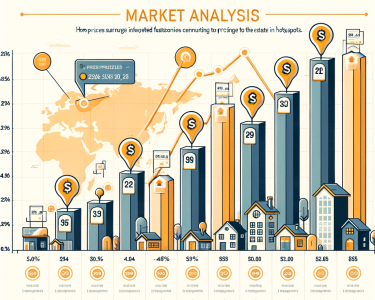Introduction
The world of real estate is evolving rapidly, thanks to the advancements in technology. Gone are the days when buying and selling a property was limited to personal tours or browsing through printed listings. Today, virtual tours, smart homes, and other tech innovations have taken over the industry, making it easier for buyers and sellers alike to make informed decisions. In this blog post, we’ll explore these exciting new ways that technology is changing the face of real estate – from virtual reality tours that let you “walk through” a property without leaving your home to smart home systems that automate everything from lighting to security. So buckle up and join us on this journey into the future of real estate!
History of Real Estate
The real estate industry has come a long way since the days of paper-based transactions and showings by appointment only. Today, the industry is embracing technology in a big way, and that’s changing the way both buyers and sellers interact with the market.
One of the most obvious changes is the rise of virtual reality (VR) technology in the world of real estate. VR allows potential buyers to take “virtual tours” of properties without ever setting foot on the property itself. This is especially useful for out-of-town buyers or those who are looking at multiple properties.
On the seller’s side, tech is also changing the way homes are marketed. More and more sellers are using video to give potential buyers a tour of their home. And, thanks to social media, it’s easier than ever to share these videos with a wider audience.
But it’s not just VR and video that are changing the real estate landscape – there’s also an increasing focus on “smart homes.” These are homes that come equipped with features like smart thermostats, security systems, and connected appliances. For many buyers (especially millennials), these features are a must-have when considering a purchase.
Thanks to all of these tech advancements, the real estate industry is undergoing a major transformation. And it’s one that shows no signs of slowing down anytime soon.
The Role of Technology in Real Estate
The technological revolution has transformed the real estate landscape in a number of ways. One of the most significant changes has been the way in which properties are marketed and sold. In the past, potential buyers would have to physically visit each property that they were interested in. This process was time-consuming and often resulted in buyers feeling overwhelmed by the sheer number of options available to them.
With the advent of technology, buyers can now view properties from the comfort of their own homes via virtual tours. This allows them to get a better sense of a property before they even step foot inside it. In addition, virtual tours make it easier for buyers to compare different properties side-by-side, which can help them narrow down their options and make informed decisions.
Another way that technology is changing the face of real estate is through the rise of smart homes. A smart home is a residence that features advanced automation and connectivity features that allow homeowners to control everything from the lighting to the temperature with just a few taps on their smartphone. As more and more people become interested in this type of convenient and efficient living, it’s likely that smart homes will become increasingly common in the years to come.
Virtual Reality Tours
Virtual reality (VR) is a computer-generated simulation of a three-dimensional (3D) image or environment that can be interacted with in a seemingly real or physical way by a person using special electronic equipment, such as a helmet with a screen inside or gloves fitted with sensors.
With VR technology, real estate professionals can give potential homebuyers and renters an immersive experience of properties before they visit in person. This can be especially helpful for those who are considering long-distance moves, as VR tours eliminate the need to travel for an initial walk-through.
Some companies are already offering VR tours of homes on the market, while others are developing this capability. For example, Realtor.com has partnered with Google to provide virtual reality tours of select listings on the website using Google Cardboard viewers.
Other companies are using Virtual Reality to create “smart homes” that prospective buyers can explore. For instance, KB Home has created a model home in San Francisco that features digital assistant technology from Amazon, Honeywell thermostats, Schlage locks and more connected devices. This allows potential homebuyers to see how these products work together and how they might fit into their own lives.
As VR technology becomes more common and affordable, it’s likely that we’ll see even more real estate companies incorporating it into their business models. This could revolutionize the way we buy and sell homes, making the process easier and more efficient for everyone involved
Smart Homes
Smart Homes
One of the most significant ways that technology is changing the face of real estate is through the rise of smart homes. A smart home is a residence that uses Internet-connected devices to automate and manage tasks typically performed by the homeowner, such as controlling the thermostat, locking doors, and monitoring security cameras.
According to a report from research firm Gartner, there will be nearly 1.6 billion connected devices in use in homes worldwide by the end of 2019, and this number is expected to more than double by 2022. The growth of smart homes is being driven by declining prices for connected devices and increasing consumer awareness of their benefits.
For real estate professionals, understanding how to market and sell smart homes will be critical in the coming years. Homebuyers are increasingly interested in features like home automation and energy efficiency, so agents and brokers who can speak to these trends will be at a competitive advantage.
The Future of Real Estate
The future of real estate is looking very different than it did even just a few years ago. New technology is changing the way we buy and sell homes, as well as how we live in them.
One of the biggest changes we’re seeing is the rise of virtual reality (VR) in real estate. VR allows potential buyers to take a “virtual tour” of a property without ever having to step foot inside it. This can be especially helpful for those who are looking to buy or sell a home sight unseen, such as in the case of a relocation.
We’re also seeing more and more homes being outfitted with smart technology. Smart thermostats, lighting, and security systems are becoming more common, making our homes more convenient and energy-efficient. And as 5G network technology becomes more widely available, we’ll likely see even more advances in real estate tech, such as augmented reality (AR) applications that could provide even more immersive virtual tours of properties.
Conclusion
The real estate industry has been revolutionized by technology, from virtual tours and augmented reality to smart homes and automatic property listings. By exploring these various ways that tech is transforming the industry, we can get a glimpse into what the future of real estate holds. As technology continues to evolve, it will be fascinating to see how far this transformation goes in improving the buying process for consumers and making life easier for agents.




